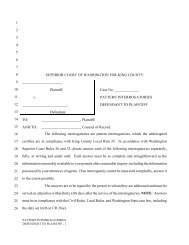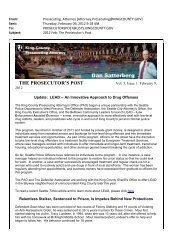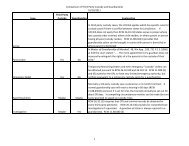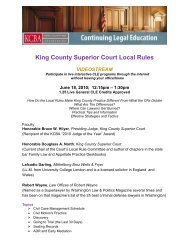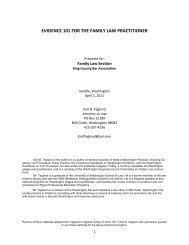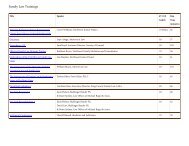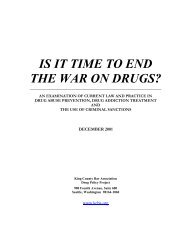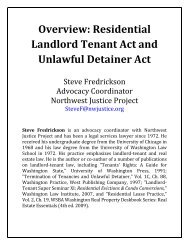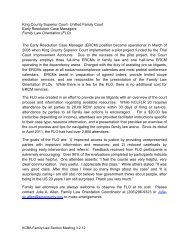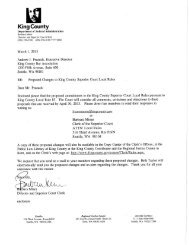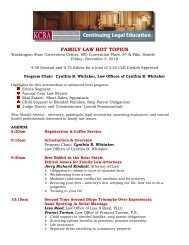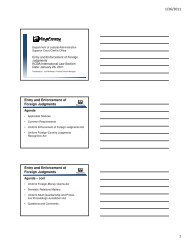Effective Drug Control: Toward A New Legal Framework
Effective Drug Control: Toward A New Legal Framework
Effective Drug Control: Toward A New Legal Framework
You also want an ePaper? Increase the reach of your titles
YUMPU automatically turns print PDFs into web optimized ePapers that Google loves.
intrastate instances of such activities. 521 Invoked to legitimate the civil rights legislation<br />
of the 1960s, federal commerce power widened to encompass social welfare objectives. 522<br />
The U.S. Supreme Court has recently acknowledged that federal commerce power<br />
is still subject to “outer limits.” 523 <strong>Legal</strong> scholars have squelched predictions, however,<br />
that the Court would ever reign in congressional power under the Commerce Clause to<br />
impose federal criminal laws that overlap with state authority. 524<br />
Prohibition and “Regulation” of Illicit Commerce<br />
The Commerce Clause arguably gives Congress authority over “regular”<br />
commerce but not over illicit commerce, where the only means to “regulate” illicit<br />
commerce is through the use of police power, which is traditionally reserved to the states.<br />
However, long-established case law recognizes that federal authority to regulate<br />
commerce among the states extends even to illicit commerce, as Congress may prohibit<br />
interstate transport of articles that "are injurious to public morals," and such “regulation”<br />
may even look like police power. 525 The power to regulate commerce extends to the<br />
prohibition of shipments in such commerce, and such power “is complete in itself, may<br />
be exercised to its utmost extent and acknowledges no limitations, other than are<br />
prescribed in the Constitution.” 526<br />
THE PREEMPTIVE EFFECT OF FEDERAL DRUG LAWS<br />
Unlike the prohibition of alcohol in the 1920s, which was achieved by means of a<br />
constitutional amendment, the basis for the legitimacy of the federal drug laws under the<br />
Constitution continued to evolve during the 20 th century. 527 In the early 1900s federal<br />
authority to regulate the possession and sale of narcotics was founded on the express<br />
taxing power of Congress, through the Harrison Act of 1914 and its aggressive<br />
enforcement against doctors and pharmacists. Early federal authority over drug policy<br />
also relied on the implied foreign affairs power, first through the enactment of the<br />
Narcotic <strong>Drug</strong>s Import and Export Act of 1922, which set strict quotas on the quantity of<br />
drugs that could be imported into the United States. 528 That measure allowed possession<br />
of narcotics without a prescription to become presumptive evidence of having illegally<br />
imported drugs. 529 The Porter Act of 1930, which established the powerful federal<br />
Bureau of Narcotics, the Marijuana Tax Act of 1937, and subsequent federal laws that<br />
stiffened penalties in the 1950s and 1960s were all based on federal taxing power. 530<br />
The <strong>Control</strong>led Substances Act<br />
Not until 1970, with the passage of the Comprehensive <strong>Drug</strong> Abuse Prevention<br />
and <strong>Control</strong> Act, or the “<strong>Control</strong>led Substances Act,” 531 was federal preemptive authority<br />
over drug policy firmly grounded in federal commerce power. What had begun rather<br />
innocuously in the early 20 th century as a federal system of medically-related registration<br />
and taxation became a blanket prohibition of the use and sale of particular drugs. While<br />
members of Congress in the early 20 th century expressed concern that the new federal<br />
role in this area was an unconstitutional exercise of police power infringing on the rights<br />
of states, by the end of that century Congress took such federal preemptive power for<br />
granted.



